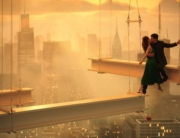Florence Cathcart isn’t a believer in ghosts. Her book exposé about ghost hunting sits next to many beds in 1919 England, and she spends her days debunking possessions and other supernatural ballyhoo. (The exciting opening scene shows off her quick skills at deduction.) She also doesn’t believe in God, which makes a believer like Robert Mallory (Dominic West) flinch for a moment. He works at a boy’s school out in the countryside, where he thinks a student died from freight after seeing an apparition of a dead boy haunting its halls. Robert has comes to Florence to ask her to investigate, and at first, she refuses, but then accepts his offer since it’s a sort of a challenge to her convictions. However, there is more to why she accepts, but I won’t say why. That would spoil the fun.
I’m glad I had a couple of days to go over The Awakening in my head before I put down my thoughts. At first, I liked the overall gothic tone, set in a gigantic old house, and especially Rebecca Hall’s performance, which I’ll get to more in a moment. But there were certain plot turns—primarily in the last 20 minutes—that initially left a sour taste in my mind. The movie never goes so far as to be stupid or dip into the incredulous, a la M. Night Shyamalan, but it comes too close… but then the implications raised in the story got me thinking: this is a sophisticated little suspense film.
And it is familiar. That’s one quality that made me not completely invested in it until the second act. Indeed, just earlier this year we saw the British The Woman in Black (also featuring Alfie Field as another scared little boy) about a skeptical person in a supposedly haunted house that, well, is.
Yet I admired Florence’s attentiveness to science and how she devised methods to see if something would appear. These scenes are interesting just in how her mind grapples with what may or may not be lurking in the halls. The story takes a turn that, yes, is a “twist,” but it gives the story some extra emotional heft, along with Florence’s ongoing conflict—what to do about her growing belief in the supernatural—and what’s going on with the people at the school, especially Imelda Staunton’s character, which she plays with both a fascinating warmth and icy conviction in equal measure. (See her in the Harry Potter films or Vera Drake for more of that.) In the last reel, the story goes deeper than something like The Sixth Sense by taking the emotional and spiritual trauma of Florence seriously enough so that what’s come before isn’t just hokey scares but relates to a psychological breakdown.
Rebecca Hall is a lovely actress with a certain star quality in her beauty that makes her appealing, but not like an unattainable beauty. (There’s a reason she’s cast as the slightly less neurotic of the two in Vicky Cristina Barcelona, opposite Scarlett Johansson). Her power to elevate the material to something extraordinary is evident in the film’s one great scare. The scene’s so effective, and not just for the build-up, which is strong, but because of Hall’s vulnerability and what she brings to Florence in the moments leading up to the scare.






Leave A Comment